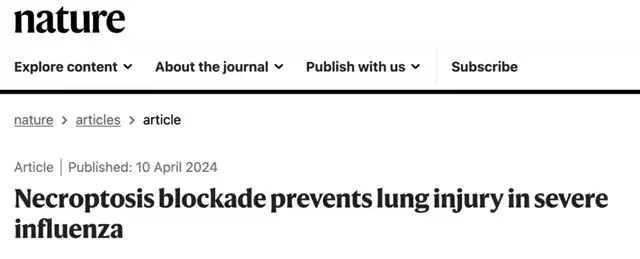Nature: Blocking necroptosis prevents severe lung injury associated with severe influenza
- Normal Liver Cells Found to Promote Cancer Metastasis to the Liver
- Nearly 80% Complete Remission: Breakthrough in ADC Anti-Tumor Treatment
- Vaccination Against Common Diseases May Prevent Dementia!
- New Alzheimer’s Disease (AD) Diagnosis and Staging Criteria
- Breakthrough in Alzheimer’s Disease: New Nasal Spray Halts Cognitive Decline by Targeting Toxic Protein
- Can the Tap Water at the Paris Olympics be Drunk Directly?
Nature: Blocking necroptosis prevents severe lung injury associated with severe influenza
- Should China be held legally responsible for the US’s $18 trillion COVID losses?
- CT Radiation Exposure Linked to Blood Cancer in Children and Adolescents
- FDA has mandated a top-level black box warning for all marketed CAR-T therapies
- Can people with high blood pressure eat peanuts?
- What is the difference between dopamine and dobutamine?
- How long can the patient live after heart stent surgery?
Nature: Blocking necroptosis prevents severe lung injury associated with severe influenza
Severe cases of influenza A virus (IAV) annually result in up to 650,000 deaths globally, leading to excessive inflammation, lung damage, and acute respiratory distress syndrome. As a defense mechanism, the presence of influenza particles activates a programmed cell death known as apoptosis, a process that deliberately eliminates specific cells to limit viral spread, achieved through the activation of the enzyme RIPK3. However, this enzyme can activate another closely related pathway during infection, which, when activated, leads to an uncontrolled cell death known as necroptosis, exacerbating the inflammation and lethality caused by the influenza virus. RIPK3 inhibitors are a popular drug target, but until now, a stable candidate drug that only blocks one pathway without inhibiting the other has not been found.
On April 10, 2024, researchers from the Fox Chase Cancer Center, Tufts University School of Medicine, St. Jude Children’s Research Hospital, and the University of Houston published a research paper in the prestigious academic journal Nature titled “Necroptosis blockade prevents lung injury in severe influenza.”
The study shows that a new candidate drug, UH15-38 (a potent RIPK3 inhibitor), has been shown to mitigate influenza A virus (IAV)-related lung damage and improve survival rates in mice. The drug is expected to alleviate a range of inflammatory symptoms and bring new insights into inflammatory disease-related pathways.

The research developed a drug called UH15-38, a potent RIPK3 inhibitor that can block necroptosis in cell lines without affecting the apoptosis signaling pathway.
The team determined an ideal dose that is likely to reduce and delay the weight loss caused by the disease in mice, with these mice fully recovered three weeks after infection. Mice treated with UH15-38 showed fewer inflammatory markers and necroptotic lung cells, indicating that selective blocking of this pathway is beneficial in preventing excessive inflammation and lung damage associated with influenza virus infection. Importantly, UH15-38 was found to be effective when used within five days after infection, suggesting a positive effect in blocking this inflammation even during the peak of viral replication.
Overall, these results suggest that UH15-38 holds promise in significantly preventing severe inflammation and disease caused by influenza virus in mice. Furthermore, the successful selective inhibition of RIPK3 (crucial for the development of necroptosis) by UH15-38 demonstrates its potential in alleviating a range of inflammatory symptoms.
Paper Link: Necroptosis blockade prevents lung injury in severe influenza
Nature: Blocking necroptosis prevents severe lung injury associated with severe influenza
(source:internet, reference only)
Disclaimer of medicaltrend.org
Important Note: The information provided is for informational purposes only and should not be considered as medical advice.



